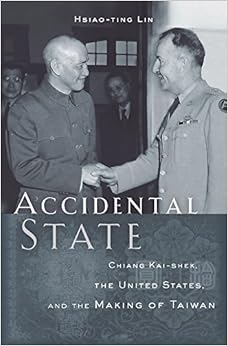Saturday, April 8, 2017
Accidental State: A Review
I read this awhile ago, but feel committed to writing up even brief commentary on every book on Taiwan that I pick up, so figure I should write about this before my reactions to it flutter away and I have to rush around trying to recapture them.
That sounds like a milquetoast beginning, but in fact I actually thoroughly enjoyed this book. I appreciated that it was trying to make a case for a line of thinking on the first years of the ROC on Taiwan rather than read as a straight history, and I appreciate that it built up evidence for that case well. The tight focus is also appreciated, narrowing in on the short span of years between the ROC "taking over" Taiwan from Japan, with a few flashbacks to the Chinese Civil War era, up through the KMT's flight to Taiwan and the early 1950s - ending more or less with the 1954 Mutual Defense Treaty.
Lin's argument is simple: nobody - not the ROC, nor the US, nor the Allies, nor Japan, nor the KMT or Communists, nor the United Nations, nor Chiang himself and certainly not Taiwan or the Taiwanese - had ever intended for the ROC or Taiwan to be what it is today. Everything about the making of modern Taiwan as the last holdout of the ROC (which I happen to view as a colonial regime in Taiwan on life support, but that view is not explored in this book) was an accident - Taiwan as it exists today is, then, an accidental state. What, exactly, it was supposed to be or what it might have been better off being remains an unanswered question. Lin explores how, once it was clear Taiwan would no longer be Japanese, the West more or less wanted to see Taiwan in the secure hands of an ally but where not as committed as one might think to that ally necessarily being the ROC (or Chiang Kai-shek, especially), as well as how the ROC itself never intended for Taiwan to be anything other than a part of China. It also makes it quite clear that a self-rule movement did exist that early on in Taiwan itself.
I did learn quite a bit reading Accidental State - much I already knew, such as the background factors that caused the 228 Massacre to play out as it did, but appreciated the further cementing of that knowledge by the narrative, and many details I had not known were filled in. While Lin does not go so far as to imply that Chiang either wanted or intended for something like 228 to happen, he certainly points out that Chiang did not necessarily think that Chen Yi had done anything wrong. The level of detail was mostly about right, and the writing is engaging and offers some depth without being overly academic. I'd say this alone makes it an important read for Taiwan and International Affairs buffs, if not an essential one for someone who is already familiar with the details of Taiwan's status and history in that era and is able to reverse-engineer Lin's central argument from same.
Of course, I have a few quibbles. Lin spends a lot of time discussing the shrinking of the ROC's territory in China, which was legitimately interesting and quite pertinent (and provided a few details my historical readings had missed, such as the final push to maintain ROC control in Yunnan), but mentions only in passing that Chiang, upon fleeing to Taiwan, decided to yet again assume the presidency (he was not in office for a few years - long story, read the book). He goes into loving detail over military shipments as well. From this book, I learned exactly how many carbines the US sent Nationalist guerillas in 1951, among other weapons and munitions (680 if you were curious, which I wasn't really). And yet the Treaty of San Francisco and Treaty of Taipei are given, together, about half a page - about the same as the space given to the entirety of that 1951 shipment. I had gone in hoping for a deeper understanding of these treaties - as I'm not a specialist and do not currently have an understanding I'm satisfied with - and came out, if anything, more confused than before.
There is quite a bit of detail on other military matters - including more lists of arms provided to the fledgling accidental state - but very little on the ideological differences between Chiang Kai-shek and KC Wu, the political slide and eventual execution of Chen Yi, or the reasons why the US spent so much time prevaricating on Chiang himself (I had known the US had not been as wholeheartedly supportive of him or his role in the ROC as many later believed, but I had not realized the extent of their ambivalence). These would have all been of great interest to me had they been explored in more detail, whereas exact munitions counts for military operations that happened in the immediate post-war era? Not so much. I would also argue these issues are more relevant to the ideological evolution of the ROC on Taiwan than, say, how many guns were sent more than half a century ago.
So, all in all, I enjoyed the book and do recommend it, especially for those with moderate, non-specialist historical knowledge but who are not neophytes to Taiwanese history. Go ahead and skim through the lists of war materiel, you aren't going to miss anything, and for a deeper understanding of some of the issues Lin unfortunately glosses over - which would have made for a stronger book if he had gone into more detail - perhaps read up from other sources.
Subscribe to:
Post Comments (Atom)


No comments:
Post a Comment